Short Answer
|
|
|
Determine whether each relation is a function.
|
|
|
1.
|
{(-2, 4), (0, 5), (2, 4), (3, 5), (-2, 1), (1, 4)}
|
|
|
2.
|
|
|
|
Write an equation that describes each sequence. Then find the indicated
term.
|
|
|
3.
|
16, 28, 40, 52, ...; 20th term
|
|
|
4.
|
600, 570, 540, 510, ...; 14th term
|
|
|
5.
|
Find four solutions of 4 x  3 y = 2. Write the
solutions as ordered pairs.
|
|
|
6.
|
Graph y =  2 x + 3 by plotting ordered
pairs. 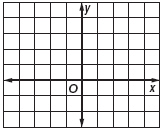
|
|
|
7.
|
Find the rate of change for the function. 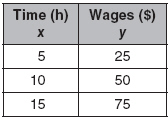
|
|
|
8.
|
The cost of gasoline varies directly with the number of gallons bought. If 4
gallons of gasoline cost $16.80, find the cost of 15 gallons.
|
|
|
9.
|
Use the graph below. Find the slope of the line. 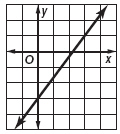
|
|
|
10.
|
Find the slope of the line that passes through the points A(5,  1) and B(3,  1).
|
|
|
11.
|
The table shows the percent of adults who used computers from 1984 through 2007.
What was the rate of change from 1989 to 2007? Source: U.S.
Census

|
|
|
12.
|
State the slope and the y-intercept of the graph of 5 x  2 y = 6.
|
|
|
13.
|
The number of miles y in a measure varies directly as the number of
kilometers x. Write a direct variation equation that could be used to convert kilometers to
miles, if 5 kilometers is about 3.1075 miles.
|
|
|
14.
|
Graph a line with slope  and y-intercept  1. 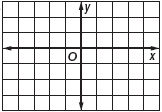
|
|
|
15.
|
What is the equation in slope-intercept form of a line with slope of  4 and y-intercept of 2?
|
|
|
16.
|
What is the equation in slope-intercept form of a line passing through points
(2, 5) and (3, 7)?
|
|
|
Use the scatter plot below that shows the relationship between the blood
pressure and ages of different people.
 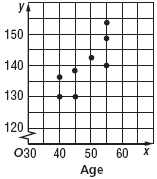
|
|
|
17.
|
Draw a line of fit for the data.
|
|
|
18.
|
Predict the blood pressure of a 20-year old.
|
|
|
19.
|
Solve the system of equations by graphing. y =   x x
y =   x x  2 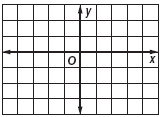
|
|
|
20.
|
Solve the system of equations by substitution. x 
5 y = 3 3 x = 2 y  4
|
|
|
21.
|
The profits P in dollars from a lemonade stand can be modeled by the
equation P( x) = 0.25 x  6.50, where x
represents the number of glasses sold. Find the y-intercept and explain what it represents
in this problem.
|